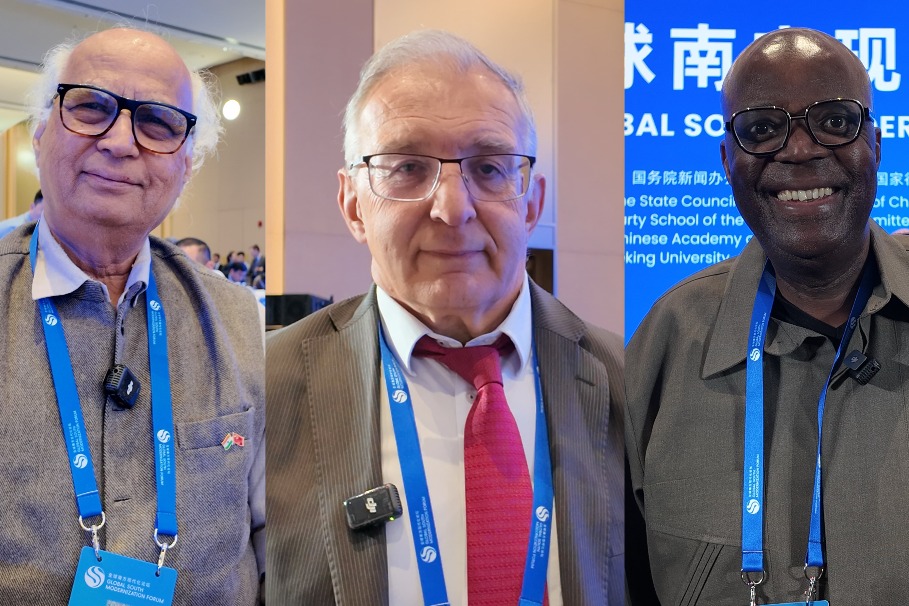Balanced strategy best option for Japan's regional role

Maintaining peace and stability in Northeast Asia is of paramount importance. But Japan's recent policy decisions and moves have raised fears that it may be influenced by certain countries that still suffer from Cold War mentality to trigger confrontations.
During the Cold War, Japan pursued a strategy of prioritizing economic development and minimizing confrontation to avoid being entangled in the United States-led hostilities. But as US ally, Japan, of late, has been promoting the US' geopolitical strategy, raising concerns worldwide.
Many US policies toward East Asia today are reminiscent of the Cold War-era, because they are intended to foster camp-based dynamics in the Asia-Pacific region. Japan should draw lessons from the Cold War, assess its own interests and adopt an approach that is conducive to maintaining peace and promoting development in the region.
In fact, every country in the region should assess the security landscape based on its own perspective, rather than accepting other countries' viewpoints as its own and devising its policies accordingly.
In 2022, Japan released its National Security Strategy, identifying China as its biggest strategic challenge, which largely aligned with the G7's stance on China at the time. But labeling China as its biggest strategic challenge does not align with Japan's true national interests.
To maintain regional security and stability, Japan needs to carefully assess the situation from its own perspective. Recent US-led initiatives, such as the US-Japan-Republic of Korea, the US-Japan-Australia, and the US-Japan-Philippines security partnerships, and the Quadrilateral Security Dialogue among the US, Japan, Australia and India are often described as "minilateral" security arrangements. These so-called security partnerships or arrangements, however, are exclusive and confrontational in nature, and risk intensifying competition and raising tensions in the region.
Japan's actions and policies within the framework of the US-Japan alliance have focused on enhancing deterrence. But the concept of deterrence has inherent theoretical and practical limitations.
A well-documented phenomenon in international relations is the security dilemma. Historically, overemphasis on strengthening deterrence almost inevitably leads to such a dilemma. Measures taken by one party to boost its deterrence — irrespective of how defensive in nature they may be — are often perceived by the other parties as aggressive and threatening. This prompts both sides to further boost their deterrence, perpetuating a cycle of mistrust and competition.
The signs of an arms race are already evident in Asia. In 2023, global military expenditure reached a record $2.4 trillion, with a significant increase in the defense budgets of Asia-Pacific countries.
Deterrence, at its core, reflects the competitive security dynamics between countries. But focusing exclusively on this competitive aspect can create an environment where no party feels truly secure, which underscores the folly of relying on deterrence as a primary security strategy.
One of the national interests of China is to maintain peace and stability and achieve the denuclearization of the Korean Peninsula. Given the current escalation of tensions, the priority should be to maintain peace and stability on the peninsula. For that, all parties should take measures to defuse the tensions through dialogue and other peaceful means.
As for denuclearizing the Korean Peninsula, China and Japan could explore new avenues of communication and negotiation. Increasing exchanges between China and Japan, as well as the ROK is necessary to help stabilize the peninsula. These moves are particularly important given the uncertainty surrounding the US' policy toward the Democratic People's Republic of Korea following Donald Trump's victory in the recent US presidential election.
China's more important national interest is to resolve the Taiwan question. The joint communique Japan and China signed in 1972 when they normalized diplomatic relations makes China's national interests absolutely clear: that Japan should adhere to the one-China principle. And for decades, Japan has upheld the principles outlined in the communique.
Although the Treaty of Peace and Friendship between Japan and China does not directly address the Taiwan question, it twice emphasizes an important principle: non-interference in each other's internal affairs.
The Taiwan question is China's internal affair; it is primarily a political issue, not a security issue. Therefore, any irresponsible comment or move related to the Taiwan question by any country is an interference in China's internal affairs.
As for issues in the East China Sea, including the Diaoyu Islands and broader maritime security concerns, China and Japan should strengthen communication between their maritime law enforcement agencies, including Japan's Self-Defense Forces and China's People's Liberation Army.
There is no denying that disputes and competition between the two sides on maritime and territorial issues sometimes lead to frictions. When such frictions arise, China and Japan should take measures to swiftly de-escalate them and redirect the bilateral agenda toward a more positive and constructive course, rather than becoming entangled in a single incident or politicizing it.
The two countries should also adopt a balanced approach on security matters and make greater efforts to maintain stability, including revitalizing, sustaining and expanding both official and non-official dialogues. On sensitive issues where government departments fail to make immediate progress, the two sides should initiate dialogues among experts to foster mutual understanding.
China and Japan, as well as China and the ROK, have close economic ties. With economic security becoming an increasingly important concern, it is crucial to remember that the pursuit of security is to ultimately serve the people's interests. Overemphasizing security issues at the expense of economic interests is not conducive to achieving this goal. Therefore, when discussing security matters, the parties should avoid jeopardizing their economic relations.
The author is an associate dean and associate professor at the School of International Studies at Peking University.
Today's Top News
- 15th National Games embodiment of high-quality development
- Lawmakers' thousands of proposals receive responses
- China warns Japan against interference
- Nation's euro bond sale shows investors' confidence
- No soft landing for Tokyo's hard line
- Commerce minister urges US to increase areas of cooperation






























